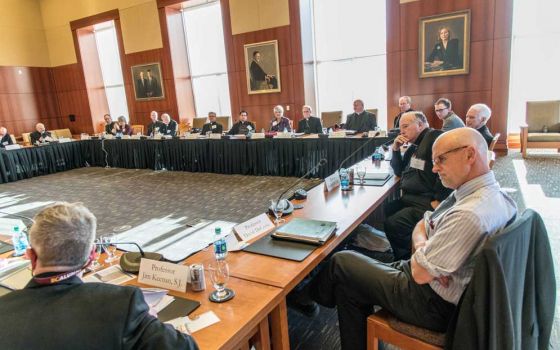
Cardinal Blase Cupich of Chicago walks away after meeting Pope Francis during his general audience in Paul VI hall at the Vatican Feb. 7. (CNS/Paul Haring)
Pope Francis is calling the global Catholic Church to make "an enormous change of approach" in how it relates to families and to renounce heavy-handed ways of implementing doctrine, recognize that teachings can develop over time, and better respect the insights of laypeople, said Chicago Cardinal Blase Cupich.
In a speech at the University of Cambridge in the United Kingdom Feb. 9, the cardinal reflected on the pope's 2016 apostolic exhortation Amoris Laetitia, calling aspects of it "nothing short of revolutionary." Cupich also said that some critics "misinterpret and misunderstand" the document by not considering it in light of the new and various struggles facing families today.
Building on a recent interview by Vatican Secretary of State Cardinal Pietro Parolin, who said the exhortation "flows from a new paradigm" Francis is proposing for the church, Cupich said the pontiff is looking for a "fully incarnational approach" in which there is a connection between what the church teaches and how real families actually live.
"Pope Francis proposes a new response for the Church's approach to families," said the cardinal, according to the prepared text of his remarks.
"It begins with a healthy dose of self-criticism, readily admitting where the Church has fallen short," he continued. "He also makes clear that in view of the new challenges families face today, there must be significant shifts in the way we approach and think about our ministry."
Cupich's Feb. 9 remarks are among the strongest and most theologically developed explanations of the meaning and method of Amoris Laetitia yet offered by a U.S. prelate.
Citing repeatedly from the exhortation itself and supporting his arguments with references to several Second Vatican Council documents as well as to the writings of Pope John Paul II, the cardinal details point-by-point what he calls Francis' "major shift in our ministerial approach."
In a brief NCR interview Feb. 8, Cupich said he wanted to speak at length about the apostolic exhortation now, nearly two years after its April 2016 publication, partly "as a way … of helping people who are expressing difficulty with understanding the direction of the Holy Father."
The cardinal said he thought the occasion of his speech, an invitation to give the annual lecture for Cambridge's Von Hügel Institute for Critical Catholic Inquiry, gave him an opportunity to reflect on the exhortation "in such a way that might bring some clarity for people who have raised questions, and then also to raise a challenge for them to also take a second look at the document."
A central part of Cupich's 16-page text considers how Amoris Laetitia balances the church's responsibilities to both teach families the church's doctrines and also to learn from their lived experiences.
In the interview, the cardinal said bishops and pastors have to "listen to where people are struggling with their own situation and their own family life [and] the demands that are made on them."
"I think that gives us some fresh insight into how we better accompany people once we listen to what their situation is," said Cupich. "I find that to be an exciting style of ministry."
"We're not machines where we can just parrot out the teachings of the church and expect that people are going to be attentive to that," he said. "It's like any good teacher. No good teacher can get the points across if in fact he or she doesn't know their audience and what their concerns are and put [them] within the context of the way that they approach life."
Divorced and remarried
Another central part of Cupich's text considers how the church can pastorally accompany people living family experiences not strictly in accord with church teachings while still upholding its doctrinal norms.
The cardinal says the "real shift" in Francis' approach "involves creating a culture of care, hospitality and tenderness in the parish community on behalf of those who have been wounded," including those who have been divorced and remarried.
Cupich also notes that Amoris Laetitia allows for what he calls a "dilemma that needs further attention," that, as paragraph 199 of the exhortation states, "different communities will have to devise more practical and effective initiatives that respect both the Church's teaching and local problems and needs."
In terms of how local churches should treat divorced and remarried persons, the cardinal says Francis has "offered a pathway forward" with his recent ordering that a letter he wrote to Argentine bishops in 2016 be declared official and published in the Vatican's Acta Apostolicae Sedis.
The Argentine bishops had issued guidelines that stated that in some situations Amoris Laetitia "opens the possibility" for divorced and remarried persons to receive the sacraments, after a thorough process of discernment. In the 2016 letter, Francis told the bishops their document "explains precisely" his meaning in the exhortation and that "there are no other interpretations."
Noting the new official status of the papal letter, Cupich states: "It will now be up to all in the Church, particularly the hierarchy, to respond in a spirit of affective and effective collegiality with the Successor of Peter."
The cardinal also cites paragraph 25 of Lumen Gentium, which states: "Submission of mind and will must be shown in a special way to the authentic magisterium of the Roman Pontiff."
"The presupposition must always be that whenever there is a family striving to live together and to love one another, the Spirit is already present."
—Cardinal Blase Cupich

Twenty-one couples celebrate their convalidation ceremony at Good Shepherd Catholic Church in Alexandria, Virginia, June 24, 2017. The Catholic Church must strengthen its programs "to respond to the desire for family that emerges in the soul of the young generations" and to help couples once they are married, Pope Francis said Nov. 11, 2017, in Rome. (CNS/Tyler Orsburn)
In the NCR interview, Cupich said he does not think the church can propose a general solution for all divorced and remarried persons.
"I think that accompanying means first of all that you have to get to know the person and walk with them," the cardinal said. "It would be against the accompaniment model of ministry if in fact you began to speak about particular questions in general ways."
"What I would say to people is look at the whole document as I'm trying to do here, laying out what the principals of interpretation are that the Holy Father's given and where the paradigm shift goes," he continued.
"I think if you follow that, then you're going to be able to have a means by which you can deal with particular cases, rather than pretending to have a general rule that's going to satisfy every particular case," he said.
'Greater attention to the voices of the laity'
Cupich's talk, given the title "Pope Francis' Revolution of Mercy: Amoris Laetitia as a New Paradigm of Catholicity," begins with an examination of some of the unique struggles facing families today.
The cardinal then details six interpretive or hermeneutical principles he says were introduced by the exhortation that "force a paradigm shift, allowing us to re-envision the Church's engagement with couples and families and open a pathway for doing so."
In the first part of the text, Cupich says that social structures that used to support families have "all but evaporated," drawing on a 2000 book by Harvard University professor Robert Putman, Bowling Alone, which examined how Americans have widely withdrawn from past norms of civic engagement.
Advertisement
Cupich begins outlining his six principles with a focus on how the apostolic exhortation understands that "God has chosen the family as a privileged place to reveal how God acts and relates to humanity and the world."
Citing from paragraph 315 of the exhortation — "The Lord's presence dwells in real and concrete families, with all their daily troubles and struggles, joys and hopes." — the cardinal states: "It is not solely in the glimpses of perfection that families may reveal the presence and action of Christ to the Church. Perhaps even more often they reveal Christ's action in their imperfect attempts at love and compassion, which permeate ordinary life."
"The presupposition must always be that whenever there is a family striving to live together and to love one another, the Spirit is already present," Cupich states. "The task of those who minister to families, then, is to open their eyes to see, and to help families discern where God is calling them."
"All of this represents an enormous change of approach, a paradigm shift holistically rooted in scripture, tradition and human experience," he continues.
"Doctrinal development is about remaining open to the invitation to see our moral teachings on marriage and family life through the lens of God's omnipotent mercy."
—Cardinal Blase Cupich
The second of Cupich's principles considers the balance between teaching families and learning from them. He says the exhortation calls for a shift in the way priests interact with families.
"In a genuinely synodal Church there is no hierarchical distinction between those with knowledge and those without," states the cardinal. "As such, the most important consequence of this call to accompaniment ought to be greater attention to the voices of the laity, especially on matters of marriage and family life, for they live this reality day to day."
"It goes without saying that this will also mean rejecting an authoritarian or paternalistic way of dealing with people that lays down the law, that pretends to have all the answers, or easy answers to complex problems," he continues. "In its place a new direction will be required, one that envisions ministry as accompaniment … marked by a deep respect for the conscience of the faithful."
The third of Cupich's principles calls the conscience of the individual person an "essential" element in the task of discerning how God is calling them to live their life.
The cardinal cites at length from paragraph 303 of the exhortation: "Conscience can do more than recognize that a given situation does not correspond objectively to the overall demands of the Gospel. It can also recognize with sincerity and honesty what for now is the most generous response which can be given to God."
He also cites the definition for conscience given in Gaudium et Spes as "the most secret core and sanctuary of a man … [where] he is alone with God, Whose voice echoes in his depths."
"When taken seriously, this definition demands a profound respect for the discernment of married couples and families," the cardinal states. "Their decisions of conscience represent God's personal guidance for the particularities of their lives. In other words, the voice of conscience — the voice of God … could very well affirm the necessity of living at some distance from the Church's understanding of the ideal."
Cupich notes that Francis urges pastors to carefully exercise discernment, working with individuals to "take into account the complexity of various situations."
"It is hard to overstate the significance of this hermeneutical shift," the cardinal states. "By fully embracing the understanding of conscience found in Gaudium et Spes, Pope Francis points not only to the possibility of accompaniment in the Church's ministry with families but also to its necessity."
The fourth of Cupich's principles says the church "must incorporate the insights of the faithful" in its understanding of God's plan for marriage. On this point he cites John Paul II's 2001 apostolic letter Novo millennio ineunte, which quoted 4th-century St. Paulinus of Nola, who said: "Let us listen to what all the faithful say, because in every one of them the Spirit of God breathes."
Process of doctrinal development
The fifth of Cupich's principles is that Amoris Laetitia upholds the universal doctrine of the church while also attending to pastoral and local concerns.
He says that Francis makes a "unique contribution" to the church's understanding of the role conscience plays in helping people discern decisions by calling in the exhortation for "responsible personal and pastoral discernment of particular cases, one which would recognize that, since 'the degree of responsibility is not equal in all cases,' the consequences or effects of a rule need not necessarily always be the same."
"The result is not relativism, or an arbitrary application of the doctrinal law, but an authentic receptivity to God's self-revelation in the concrete realities of family life and to the work of the Holy Spirit in the consciences of the faithful," states the cardinal.
"As pastoral discernment attends to the reality of a situation, the conscience based Christian moral life does not focus primarily on the automatic application of universal precepts," he continues. "Rather, it is continually immersed in the concrete situations which give vital context to our moral choices."
"God has chosen the family as a privileged place to reveal how God acts and relates to humanity and the world."
—Cardinal Blase Cupich
The sixth and last of Cupich's principles is that doctrine can develop in the church as a result of its ministry to families.
"Doctrinal development is about remaining open to the invitation to see our moral teachings on marriage and family life through the lens of God's omnipotent mercy," states the cardinal.
"Doctrine can develop as a result of the Church's merciful accompaniment of families because God has chosen the family as a privileged place to reveal all that the God of mercy is doing in our time," he continues. "To deny this, the Holy Father warns, would make us guilty of the 'worst way of watering down the Gospel.' "
Cupich ends his talk by examining how he thinks some critics of Amoris Laetitia have misinterpreted or misunderstood the text.
"Instead of actually attending to the present reality of people's lives today in all of its complexity, they limit their scope to an idealistic understanding of marriage and family," the cardinal states.
"They also fail to see how the various issues related to marriage and family life are connected to each other, treating them instead as discrete questions," he continues. "As a result, they narrow their options when it comes to responding to the lived realities of people's lives, since their knowledge is fragmented and incomplete."
In the NCR interview, Cupich said he understood that for some people adapting to the teaching of Amoris Laetitia "will take some adjustment."
"We have to be patient with that," said the cardinal. "If we're going to be a teaching church, a teaching church has to be patient."
Said Cupich: "I just want the discussion to keep moving. I don't want this great document in some way to just be put on a shelf and [to] say that we can go on as we have before. I think that the document doesn't allow us to do that. I just want to make sure that we keep this on the front burner."
[Joshua J. McElwee is NCR Vatican correspondent. His email address is jmcelwee@ncronline.org. Follow him on Twitter: @joshjmac.]







